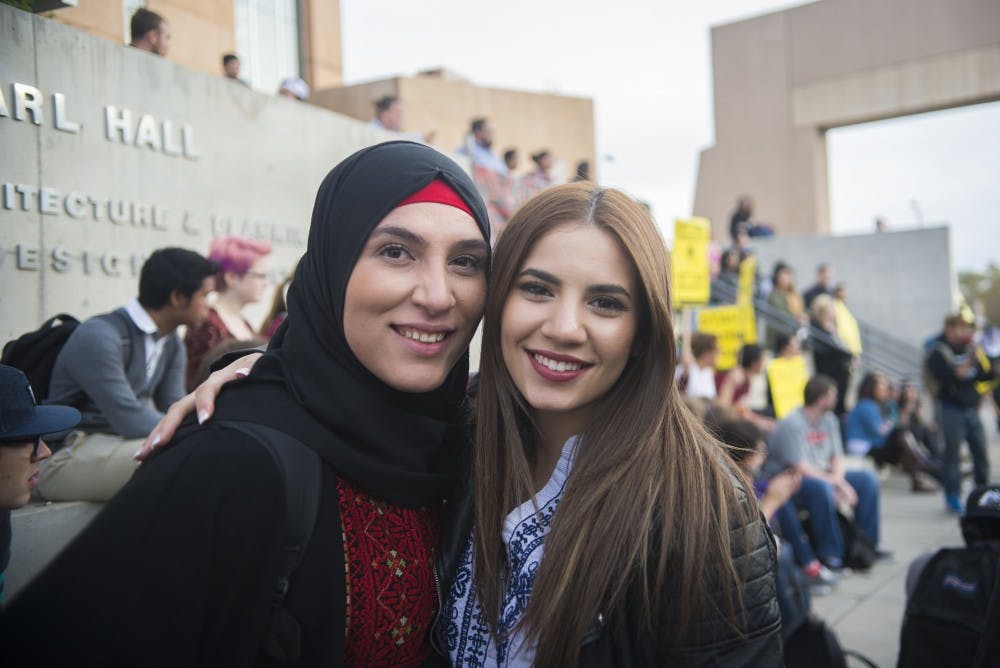This story is the second in a series on post-Election Day reactions from different groups in the UNM community.
Serene Akkad was in disbelief. She feared how she, as well as other Muslim Americans, would be viewed after this. It was something unprecedented for her community, and the potential aftershocks could be devastating.
There are two events now inked into U.S. history that this description could apply to. The first is September 11.
The second is Nov. 8, when the country that Akkad was born and raised in elected its next president — an individual who has said he wants to ban Muslims from entering the country.
Akkad, who is also president of the Muslim Student Association at UNM, watched as the election results and Electoral College vote projections came in, and like many other Americans — Trump and Clinton supporters alike — she couldn’t believe what was unfolding.
“There’s no words to describe it. How can someone with such hateful rhetoric become our president?” she said. “The president is someone we look up to, and to have someone like that come into office is just scary.”
Bayan Jaber, also a Muslim American student and MSA member, said the outcome of the election, as well as what has transpired in the days since, was only the latest development in a resurgence of Islamophobia across the country.
As the New York Times recently reported, there was a 67 percent spike in hate crimes against Muslim Americans from 2014 to 2015. There were levels of anti-Islam acts last year not seen since the 9/11 attacks. Even before Election Day, Akkad said her mom would plead with her to not wear her headscarf in public.
“It takes you by shock,” Jaber said.
In some ways, nothing has changed. The group has always emphasized unity, Akkad said. Sticking together against the sometimes hateful culture of a post-9/11 America is something Muslims in the U.S. are accustomed to.
In other ways, however, they are more fearful that their peers might view them in a negative light. The leader of their country has at times personified that culture, and because of that Jaber said she and other Muslim Americans now have to “walk on eggshells.”
“What’s scarier than anything is that people are listening to him and constantly supporting him,” Jaber said. “He’s made statements that you can’t simply apologize for — and he didn’t even do that.”
Get content from The Daily Lobo delivered to your inbox
Both Jaber and Akkad acknowledge that there will always be people who look at them differently for wearing a headscarf, or after being told they are Arab. However, they felt that the nation was progressing in the right direction, socially, under eights years of President Barack Obama in the Oval Office.
Now, Jaber said, it feels like the country has taken “10 steps back.”
When asked what a Trump presidency means for young Muslim Americans, Akkad and Jaber were at a loss for words, a silence that speaks volumes about how they say Muslims feel all the time, and now to a heightened degree.
“It’s hardly ever that we’re given a voice,” Akkad said.
Akkad said the levels of hate that they have come across now are much higher than immediately following 9/11, a time when “no one would come out of their houses for weeks.”
Trump’s proposals from his campaign — which also included a national registry of all Muslims in the U.S. — were embraced by some, but criticized by others for containing racist undertones. Many view his election last week as an affirmation that it’s now acceptable to lash out against others with different lifestyles.
Jaber said people should just view their Muslim peers as who they are — students exercising their freedom of speech and religion who go through the same peaks and valleys that any other college students do.
“We’re just as patriotic as the next American,” Akkad said. “We contribute just as much to American society as anyone else. We’re lawyers, we’re doctors, we’re politicians.”
Akkad said that while she is in favor of screening people coming into the country, Trump’s proposed policy of completely banning an entire group of people crosses a line that they never knew could be crossed.
“I don’t think we ever thought that it was going to get to this point,” Jaber said. “But it has.”
Akkad, who wears a traditional headscarf, said it has never led to instigation or harmful words thrown her way before Election Day.
Since then, she said people at three different places have told her to “take that thing off your head” and “you don’t belong here, go back to your country,” even though she was born and raised in New Mexico.
Jaber said in a country that encourages freedom and justice, those acts — as well as others that have occurred around the country — make the U.S. look hypocritical to the rest of the world.
For a community that can’t actively do very much about how other people perceive them, non-Muslim allies can still help, Akkad said, if by no other means than by speaking out and getting to know a Muslim American student.
“Put a face to a Muslim,” Jaber said. “Meet a Muslim, hang out with a Muslim, have coffee with a Muslim.”
And many have. After a male student recently attempted to pull the headscarf off a female peer in Zimmerman Library, the MSA received messages of support, a comforting reassurance to the group.
“We just have to stick together,” Jaber said, “and protect one another more than anything.”
David Lynch is the editor-in-chief at the Daily Lobo. He can be reached at editorinchief@dailylobo.com or on Twitter @RealDavidLynch.






